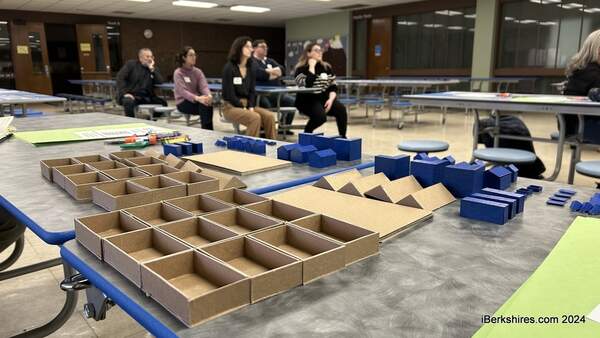
Pittsfield Schools Subcommittee OKs Policies on Education Stability
PITTSFIELD, Mass. — Pittsfield Public School's Policy Subcommittee adopted three policies to make sure that homeless, foster, and connected military students have education stability.
The policies are to ensure that these students are receiving proficient education and that they are immediately enrolled upon entering the district.
Director of Curriculum Judy Rush's examination of the current policy resulted in her offering a revised homeless student policy and two new policies to the subcommittee.
Last week, the subcommittee voted unanimously in favor of each policy's approval on first reading.
The Homeless Students policy is a revised policy that has been driven by the McKinney-Vento Homeless Assistance Act that ensures homeless children and youth have equal access to the same free and appropriate public education, including public preschool education, as provided to other children and youths.
It has most recently been authorized under the federal Every Student Succeeds Act of 2015.
This policy was altered to make migratory students considered homeless and gave foster students their own set of rights, meaning they are no longer under the Homeless Students policy.
In the past, the McKinney-Vento Act stated that if a student was waiting for foster care they were homeless and fell under that policy. Foster care students now have a policy of their own because students in foster care still need support once they are not considered homeless, Rush said.
In the unrevised policy, foster students were treated as normal students once they were in a foster home, and their educational needs after moving into a foster home are not addressed.
Migratory students were added to the policy under the definition of homeless students.
Rush explained that the school district has to provide transportation for homeless students.
"When we have our state training they say, 'If we have to fly them in by helicopter because the family wants that student back in our district and for some reason, they are living somewhere else, we are obligated to provide transportation no matter what,'" she said.
Committee member Dennis Powell asked Rush how the district collects data about homelessness and how they know which students are homeless.
Interim Superintendent Joseph Curtis said a structure has been developed involving school administration, adjustment counselors, and staff who regularly work with students. Under this system, staff will report students who identify themselves as homeless and this activates a series of communication with the deputy superintendent's office, where Pittsfield High Principal Henry Duval is filling in as interim, so it can begin outreach and assess the student’s needs.
A record of the work done with the student is entered into the student information system that collects information about homeless and foster students.
At the end of every school year, the department reviews those lists and certifies them officially so they can be sent to the state. Curtis said that this way, everyone in terms of leadership and people who need to know are aware of which students are homeless.
Powell asked Curtis if students in the district will openly identify as homeless to school staff. He thought that some kids may be afraid to be honest about their status because of the stigma that comes with being homeless and asked if some students may be slipping through the cracks because of that.
Curtis said they have an obligation as a school system to do outreach to find homeless students. He said often a school adjustment counselor will be having a confidential conversation with a student and the student will mention moving from house to house or couch to couch.
The student will then privately and confidentially confirm that they are OK with claiming homelessness and the deputy superintendent's office will follow up with the supports they need.
"We do keep it as private as possible,” Curtis said.
One of the new policies that was adopted is the Educational Stability for Foster Care Students policy.
This policy designates a district and building point of contact, which is the deputy superintendents' office. It also emphasizes best interest determination, meaning when a student is placed in foster care all appropriate parties come to a meeting and determine if it's in the best interest of the student to remain in the school district or move to a different district. Typically the student remains at the school of origin, Rush said.
The school or district of origin is responsible for arranging and the payment of transportation for foster care students out of the Title l budget.
This policy also states that a student can immediately enroll in a school without having immunization, medical, and school records. As long as they have an immediate contact, foster students can be enrolled and records can be found later.
The district of origin also has fiscal responsibilities for the foster student under this policy.
Rush said school officials meet with the Department of Children and Families at least once a month because sometimes students do slip through the cracks. PPS and DCF share records and then merge information so they can do the best they can to identify students in need and give them support.
Another new policy the committee adopted is for Educational Stability for Connected Military Students. This is a result of the passage of the Valor Act of 2012 that made Massachusetts become a member of the Military Interstate Massachusetts Children's Compact Commission.
In accordance with the Valor Act, the state Department of Elementary and Secondary Education is committed to providing support and assistance to the students of active duty military families.
The gist of the policy is to ensure the timely enrollment and graduation of this mobile population, Rush said.
This policy also designates deputy superintendents' office as the district point of contact.
Placement is emphasized in this policy. It specifies that the military-connected student should be placed in courses that are parallel to the ones they took in their prior school until they can do an assessment. This includes honors courses and special education.
This policy also gives military-connected students wiggle room with school attendance policies as they may have missed school from movement or need to visit a parent who is on leave.
Tags: homeless, policies,















